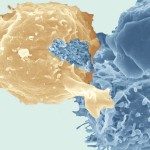Lien vers Pubmed [PMID] – 11505450
J. Med. Virol. 2001 Sep;65(1):97-104
Adhesion molecules are essential for the immune response. They are involved in the regulation of cell-to-cell contact, thereby enabling leukocytes to communicate. Circulating forms of adhesion molecules are found in the serum of healthy individuals. Raised levels have been associated with disease severity in HCV and other infections and thus appear to be good markers of endothelial damage. The levels of soluble Vascular Cell Adhesion Molecule-1 (sVCAM-1) and of sP and sL-selectin in the plasma of children hospitalised for dengue in French Polynesia were monitored. Studies from the 1996/1997 dengue-2 outbreak, showed that levels of sVCAM-1 increase steadily during the febrile period, peak on day 7, and then decline relatively rapidly. Disregarding the time frame within the febrile period, sVCAM-1 levels were always higher compared to controls. There was a significant association between sVCAM-1 levels and dengue haemorrhagic fever, a severe manifestation of dengue virus infection characterised by plasma leakage. No association was apparent between sVCAM-1 levels and primary vs. secondary dengue virus infections. Levels of sP-selectin and sL-selectin were significantly higher in primary compared with secondary infection but were not different in patients presenting with plasma leakage. Lastly, sVCAM-1 levels were significantly higher in an outbreak of severe disease in 1989/1990 (dengue-3) when compared to a non-severe outbreak in 1988/1989 (dengue-1) and a mild outbreak in 1996/1997 (dengue-2). The results suggested that levels of sVCAM-1 production might prove to be a useful marker in the management of severe dengue.

